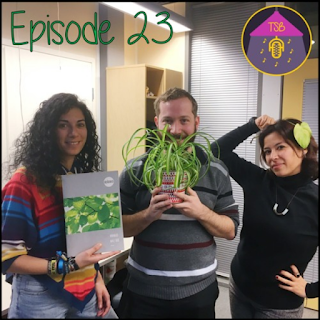Time flies and personal thoughts on outreach
Have you ever had that feeling that a day, a week, or a month has just gone by at such a high pace, that you barely grasped the time flying by? This is what just happened to me as I realized that I haven't been writing for this blog since December! Both life at work and outside of work were quite busy, which contributed to me not noticing time passing by so quickly.
At work, I was busy updating and finalizing a manuscript - previously rejected - which is finally available for discussion in the Atmospheric Chemistry and Physics Discussion (open access) journal.Outside work, theatre has been keeping me busy, as I was helping my friends from Soup Troupe and The Really Small Theatre Company with their production of Apologia by Alexi Kaye Campbell (as stage manager), which is performed these days in Helsinki.
As I was reviewing the past few months to analyse why it went by so fast, I remembered also one thing that I did last year, but about which I dot not write on the blog yet: I participated for the very first time in a podcast!
 | |
| Click on the picture to directly access the podcast episode on SoundCloud.(NB: The podcast is also available on other platforms.) |
In a time when science is doubted, it is extremely important for the science community to explain as clearly as possible what it does. Science is often funded by public money and in order to keep these funds, one has to make a strong case, why research is important and worth financing. If a society and/or a government think that money would be better invested elsewhere, they will decrease research budgets. However, science has become increasingly complex. How is possible to explain in clear terms what science does without oversimplifying?
This is pretty much the exercise that I did by talking about my research in the podcast in the simplest terms, trying not to compromise the accuracy of my statements. I first thought that I would never listen to the podcast (as most of us don't like to listen to one's recorded voice), but when it came out I thought that I will give it a try for a few minutes. I ended up listening to the whole piece and it was a great way to assess the way I speak and what I had said.
As a theater person (I've acted too), I have some experience in front of an audience and I usually get positive feedback about the various presentations I give about my research. I also believe that I am able to give useful feedback on other people's presentations both of the content (if I am familiar with the science presented) and the form (I've directed too). However, the opportunities to listen (or watch) myself giving a speech are quite rare. Listening to the podcast was a good way to assess strengths and weaknesses when it comes to speaking to an audience outside of my field.
It was really useful in that regard and I promise that I will not run away from being recorded in the future, but embrace such experiences so that I can improve further my presentation skills! Thanks TBS podcast for giving me the opportunity!
 |
| The author of this post presented his research during the seminar of the Climate Change Research Programme at the Finnish Meteorological Institute on 14 February 2019. |
Comments
Post a Comment